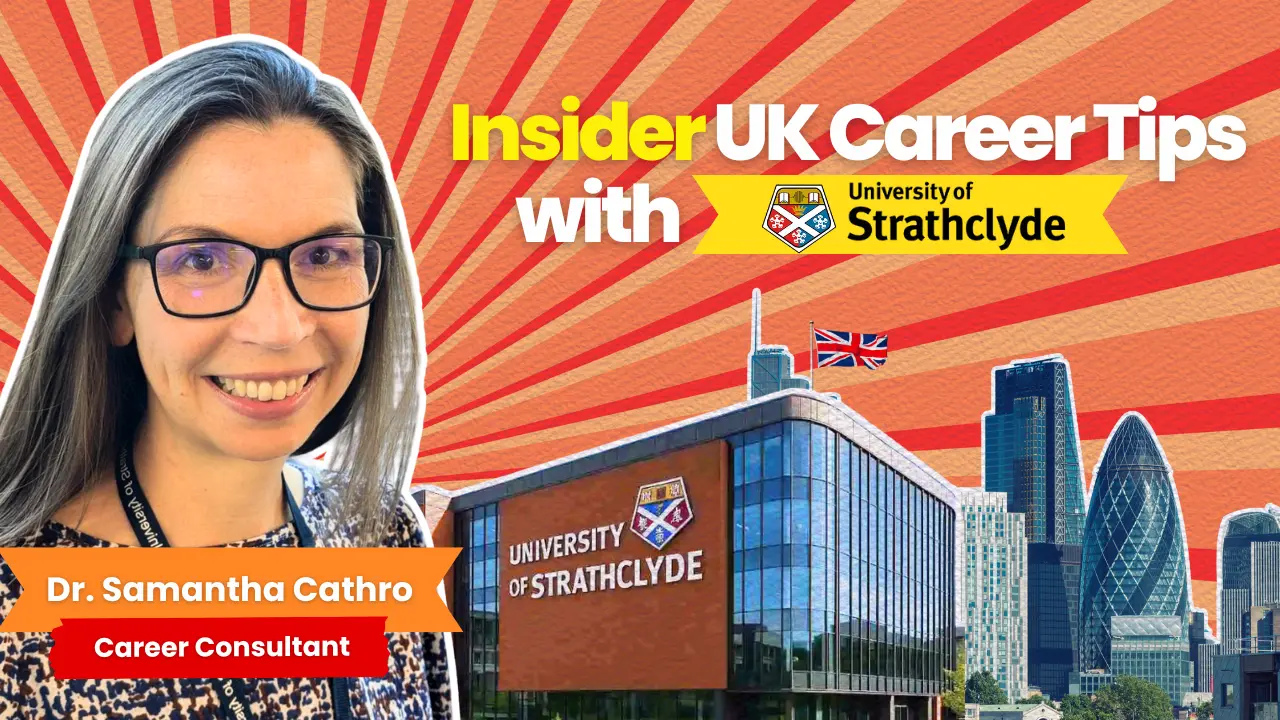Expert Insights
Beyond the Headlines: How Career Expert Jessica Helps International Grads Navigate the UK Job Market

Jessica, a university careers officer in the UK, shares her perspective on how the job market has shifted post-COVID, the skills graduates need today, and how international students can give themselves an edge. She discusses mistakes students often make, the realities of AI in recruitment, and the importance of being flexible in your job search.
Q. Tell us about the current job market in the UK for recent graduates.
I think the job market in the UK at the moment is fairly stable. There has been a lot of publicity about it being in a poor state in the UK but we don't believe it's quite as bad as the news are making out. We certainly, along with many countries, had a huge period of growth post-COVID. So in 2022 and 2023, we had a lot of opportunities. That has now settled down and we're returning to a pre-COVID job market which is fairly stable.
Q. What industries and sectors do you particularly see growing post-COVID?
If you look at the government's industrial plan for the UK for the next five years, the areas where we're expecting high growth and where we require skilled graduates are areas like advanced manufacturing, clean energy industries, digital technologies, financial services and life sciences. Those are key areas for growth in the UK at the minute.
Q. What are some of the key skills employers are looking for right now?
Employers in the UK look for graduates who are self-aware, who are resilient, who are able to take responsibility for themselves, their role and their career progression. Specific skills that are regularly mentioned are things like time management, adaptability and confidence. We know that employers look for graduates with a clear understanding of their own strengths, their motivations, their values and what they can bring to an organisation to help it meet its goals. Particularly now in the age of AI, employers are looking for students who have a really clear understanding of the role, why they're right for it and why it is right for them as well.
Q. How can international graduates make themselves stand out in the UK market?
Students need to be strategic and flexible in how they search for work. That means utilising as many options as possible, such as the hidden job market (opportunities that are only advertised through personal networks), advertised roles, job boards, a career service, LinkedIn. And also focusing in the right areas. Looking particularly for areas where there are skills gaps, areas where employers struggle to recruit. Those are areas where international students can be particularly competitive.
To help with that, international students really need to make the most of their time at university to access opportunities and build networks while they're studying. That really helps students to stand out once they've graduated.
Q. Since you work with students every day, do you see any common mistakes they are making during the job search?
We see a few things. One is a high volume of maybe lower quality applications. Applications where they haven't tailored to the role, they haven't tailored their CV or their application. We're seeing more and more applications that appear to be almost solely written by AI. And I completely understand why students are doing this. They need to find a role and you can apply very quickly using AI. But we're hearing from employers that they're receiving more and more applications and CVs that are an identical formula. They're struggling to shortlist on that. We recommend that applicants write applications that really show off what is unique about them, to help them stand out from all the applications written by AI.
We're also seeing some international students be quite inflexible in their demands. For example, sponsorship or looking only to work within their degree specialisms. The UK has a very open graduate job market. You very rarely have to have studied a particular course in order to access a particular role. A student who's done marketing will assume they have to find a marketing role and they will in that way disqualify themselves from looking a lot wider at other roles that they could access and be successful in. It's important that students research a broad range of roles and industries they could work in.
Another common mistake is not being ready to talk about their visas with employers, particularly if they're looking at a graduate visa and going for a smaller company. Employers aren't necessarily completely clued up on how the visas work. So students need to be ready to explain their position and explain their right to work just in order to ensure that the employer understands their conditions. We provide lots of support and resources to help students have these conversations with employers.
Q. How important is networking in the UK job market, especially for international students?
Networking is so important in the UK job market, particularly for an international student. We often talk about this thing called the hidden job market, where roles are not actually advertised. Companies aren't making job descriptions and putting them out. But if you meet those companies, if they know of you, they know of your skill set, you've maybe done some work with them or with an adjacent company, then when they come to thinking about their needs, they'll think, ‘oh actually, we're aware of this person’. It will become a direct conversation that could result in a job. That is not particularly unusual, especially for international students.
In order to do that, students need to be using their career service to meet employers, go to employer events, look at internships, volunteering, shadowing opportunities, getting on LinkedIn and reaching out digitally as well.
Q. What tips do you have for writing CVs and cover letters for the UK job market?
For the vast majority of industries, you're looking at two sides of A4 in the UK job market. We don't really look for identifying information, so include your name, contact details, LinkedIn profile. We don't need things like marital status, a photograph, gender or sexuality. It should be structured based on whatever the role is. Your most relevant education or experience at the top and then less relevant going down. A lot of people assume it has to be chronological in terms of time but it doesn't.
A traditional cover letter is usually one side of A4. It should start with an introduction talking about why you're interested in the role and why you believe you're a good match for it, and then conclude. Not many companies now use that very traditional format based on the idea that you'd be sending a letter. Lots of them now use application forms or specific questions that you answer differently. We encourage students to look at the resources from their university to see what the different conventions are and how to navigate them. For example, we have video guides, templates, examples for different sectors, and AI tools to evaluate your applications.
Q. How do you see AI shaping opportunities for students in the coming years?
I think it will create both opportunities and challenges. We're still really early in the AI careers journey. Specifically in terms of recruitment, it is already causing changes in the way that employers recruit students. Employers are feeding back to us that they're seeing more and more formulaically identical CVs and cover letters. They're beginning to turn back to more traditional recruitment methods.
We're seeing more in-person interviews earlier in the recruitment process so that employers can actually meet the person and ensure that no one's using live AI prompts.
We're also aware of employers turning down applications because they believe the applicant has used AI in writing their cover letter or application. Other employers require students to know AI in order to qualify for the role. AI can be a brilliant tool. It can help refine what you've written. It can be a really good thing when used appropriately.
In terms of jobs, we believe AI may increase the need for international students and graduates to be more flexible. If you're married to one area and then AI develops to a point where it can do that, you're at more risk than if you've pushed yourself, learned more, broadened your skill set and adapted to different areas. Then you can move with it rather than be replaced.




